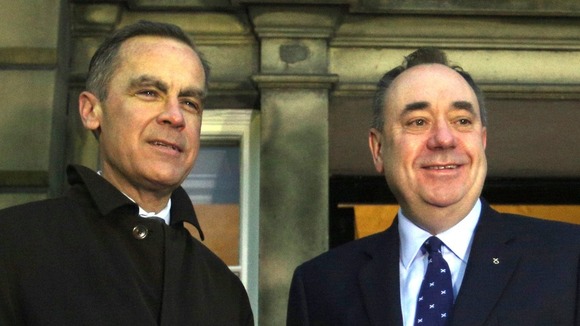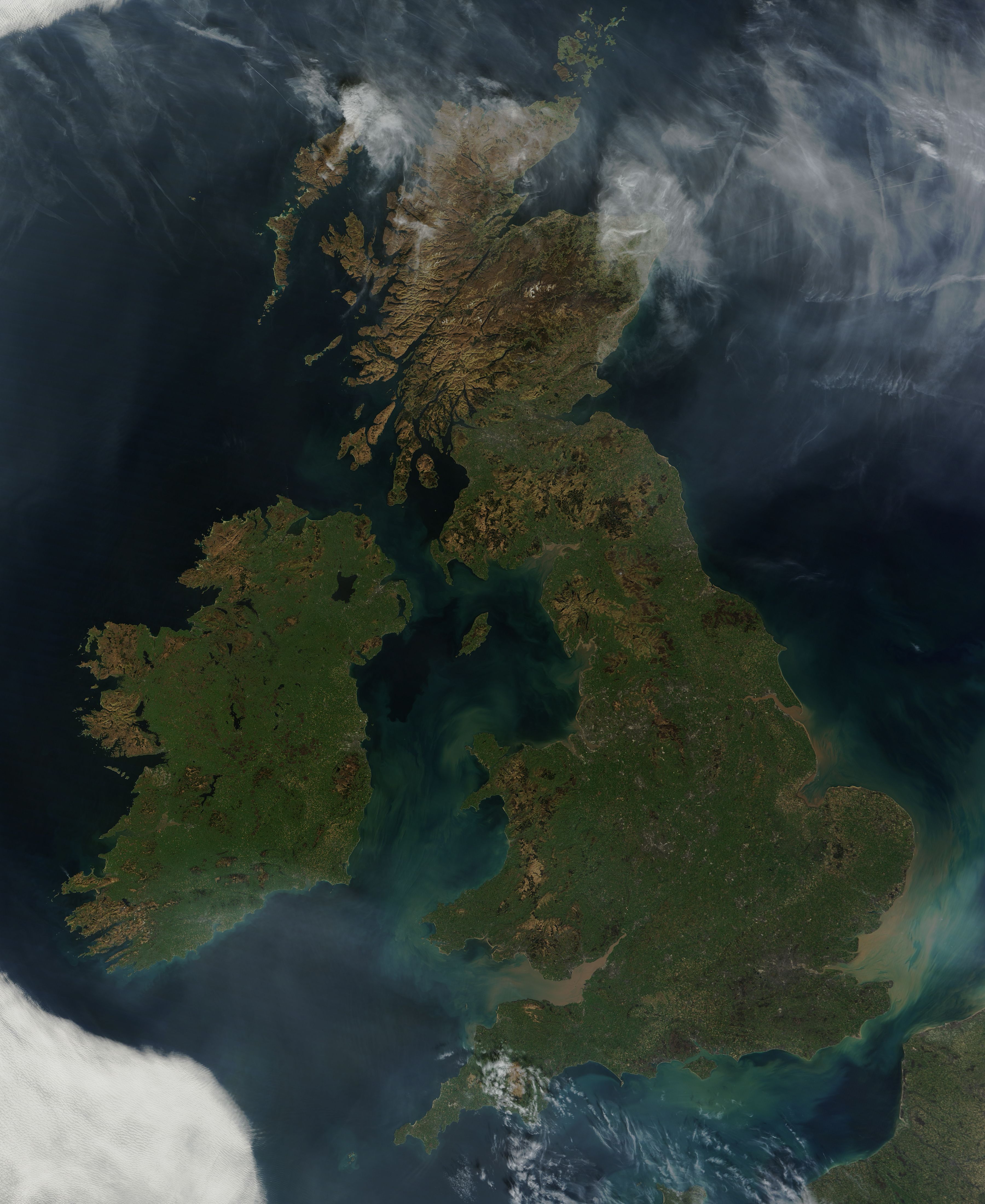So we now know where the three would-be chancellors post 2015 stand on a formal currency union. Or do we?
Well delivering his speech in the West End of Edinburgh, George Osborne said to the people of Scotland "If you walk away from the UK you walk away from its currency". It was a threat with a clear political agenda. Blackmail, in other words. The BBC's Douglas Fraser commented "Pro-union parties said they would not negotiate ahead of the referendum -
they're now doing so, but only to rule out negotiations." About the best thing any BBC reporter said all day. Had this been a unilateral referendum with no Edinburgh Agreement signed then I might have respected David Cameron's wish not to debate. I would have especially respected his wish if he said that his government would make the transition to independence as smooth as possible for the sake of the Scottish people if they decide democratically that they wish to become a sovereign nation. But his government has not shown any respect to the Scottish people by sending George Gideon Osborne (that is actually his middle name!) to say what his government would threaten to do if they vote for independence. By not even saying that a formal currency union would be one option for an independent Scotland his contempt was complete. If it just so happens that a majority of people have already decided to choose independence then George Osborne, Ed Balls and Danny Alexander have decided that the people of Scotland are making a big mistake. But more to the point this is proving that David Cameron is no longer treating this simply as a debate between people living in Scotland, the UK Government has actually come up here and interfered. That means David Cameron has an absolute moral obligation to come up here and debate with Alex Salmond so he can explain his Government's posturing. He is now accountable to the people of Scotland.
Sunday, 16 February 2014
Monday, 10 February 2014
Good luck to our athletes in Sochi
Very rare is it that Scottish and British are effortlessly interchangeable the way English and British are on so many occasions. But as I write this, Team GB are taking to the ice to throw some heavy stones along the length of a rink towards what I hope will be Olympic glory. With the lads skipped by Lockerbie's David Murdoch and the lasses skipped by the stunningly attractive Eve Muirhead (sorry I couldn't resist the comment) the curlers may as well be called Team Scotland which is what they are in the World and European Championships.
I can remember in 2002 the jubilation that followed the team's success in Salt Lake City. Everybody was saying "this is Team Scotland" and there were saltires a many in celebration. I myself agreed, this is a moment for the Scots to be proud of but I felt that not as a Scottish nationalist so much as someone who preferred the idea of a united island country called 'Great Britain'. Yet that wasn't in antipathy towards Scottish nationalism because I didn't really have a clue about Scottish politics. I knew there was a devolved Scottish parliament, I can remember that being a big thing in 1997 but if anyone were to ask me 'Who is Alex Salmond?' I would likely have shrugged my shoulders and said "One of the MSPs who campaigned for devolution" and nothing else. It was only in 2006, a year before the SNP's first term, that I started to read up about and follow the Independence movement. But it has little bearing on my sporting allegiances. I may support Scotland in the 6 nations but in the footy friendly last August I supported England because that's what I normally do in football and with some competitive games still left in the qualifiers each win mattered at least mentally. My sporting allegiances vary because put bluntly, your country is great at some things, alright at others and crap at the rest.
Eve Muirhead and her rink, Team Scotland/GB
I can remember in 2002 the jubilation that followed the team's success in Salt Lake City. Everybody was saying "this is Team Scotland" and there were saltires a many in celebration. I myself agreed, this is a moment for the Scots to be proud of but I felt that not as a Scottish nationalist so much as someone who preferred the idea of a united island country called 'Great Britain'. Yet that wasn't in antipathy towards Scottish nationalism because I didn't really have a clue about Scottish politics. I knew there was a devolved Scottish parliament, I can remember that being a big thing in 1997 but if anyone were to ask me 'Who is Alex Salmond?' I would likely have shrugged my shoulders and said "One of the MSPs who campaigned for devolution" and nothing else. It was only in 2006, a year before the SNP's first term, that I started to read up about and follow the Independence movement. But it has little bearing on my sporting allegiances. I may support Scotland in the 6 nations but in the footy friendly last August I supported England because that's what I normally do in football and with some competitive games still left in the qualifiers each win mattered at least mentally. My sporting allegiances vary because put bluntly, your country is great at some things, alright at others and crap at the rest.
Wednesday, 5 February 2014
Currency union matters as an option, formal or informal
There are few people in a position of power at a UK level that those of us who advocate Scottish independence have much respect for. Yet the Governor of the Bank of England is one of those few. Amazingly Sir Mervyn King is reputed to have had a far better relationship with Alex Salmond than with Alistair Darling, a testament perhaps to just how badly Brown and Darling handled the economy. Salmond was involved in some discussions relating to currency union with King before Mark Carney took. In his role as governor Carney is not going to have the same agenda as a politician, he is simply there to do his job and being Canadian his opinion on whether or not Scotland should be independent is not going to be as strong. On the one hand he may feel Scotland is only seeking what most Canadians desired during the years of colonial Britain, on the other hand he may see echoes of the Quebecois referendum in Scotland's big decision. Either way his involvement in the current debate is reasonably neutral and respectable and is not holding back from providing answers out of any fear of 'pre-negotiations'. Alex Salmond and Mark Carney got on with the technical discussions and the latter presented his analysis a week ago.
It is of no great surprise or worry that compromise has to be found in formalising a currency union. Yes, the UK government remains the main user of the Pound Sterling and the founding state of the Bank of England. But Scotland has a stake in the currency as well and most importantly it holds the cards on this issue. The UK government has indicated it may refuse a formal currency union but actually it is the UK government that will urgently feel the need for discussions with the other government for the formalisation of the common currency area.
Mark Carney and Alex Salmond
It is of no great surprise or worry that compromise has to be found in formalising a currency union. Yes, the UK government remains the main user of the Pound Sterling and the founding state of the Bank of England. But Scotland has a stake in the currency as well and most importantly it holds the cards on this issue. The UK government has indicated it may refuse a formal currency union but actually it is the UK government that will urgently feel the need for discussions with the other government for the formalisation of the common currency area.
Saturday, 4 January 2014
Why not all nationalists are Nationalists.
My first post in 2014, the year Scotland decides. What could I write about? Well maybe I could get everybody into the mood by stirring up a bit of nationalism. How about that? Of course I would be far better discussing the practical benefits of a Yes vote but maybe I should tackle this subject sooner rather than later.
There is nothing wrong with nationalism as such whether that's Scottish nationalism or British nationalism. But it's when it is used emphatically in political discourse that makes it a problem. We're entitled to our own emotions and our own desires for our country. But when you have to make the case for or against a political viewpoint it has to be done so with proper reasoning.
Scottish nationalists on the whole understand this which is why their focus on the Scottish independence debate is about creating a better and more empowered society. Some may express the sentiment "Scottish not British" but it is more a personal thing for them. British nationalists, that is to say those who support the union for emotional reasons (which it's fair to say isn't everyone who supports the union), have on the other hand often gone all-out in trying to put identity at the heart of the debate as though the only way to have any strong bond with your friends and family south of the border is to share a 'nation'.
There is nothing wrong with nationalism as such whether that's Scottish nationalism or British nationalism. But it's when it is used emphatically in political discourse that makes it a problem. We're entitled to our own emotions and our own desires for our country. But when you have to make the case for or against a political viewpoint it has to be done so with proper reasoning.
Scottish nationalists on the whole understand this which is why their focus on the Scottish independence debate is about creating a better and more empowered society. Some may express the sentiment "Scottish not British" but it is more a personal thing for them. British nationalists, that is to say those who support the union for emotional reasons (which it's fair to say isn't everyone who supports the union), have on the other hand often gone all-out in trying to put identity at the heart of the debate as though the only way to have any strong bond with your friends and family south of the border is to share a 'nation'.
Sunday, 29 December 2013
Just how should we remember World War I?
The village of Ousby in Cumbria sits upon the school bus route which I took many times when I was living in the Eden Valley near Penrith. What I was unaware of was that in times past Ousby was one of the luckiest communities in England. You won't find a War Memorial in the village for those who perished in the 1914-1918 conflict. You might think 'my goodness, what a scandal how can they not care about their war dead?!' But that's just it - there are no war dead. For Ousby is one of only 53 'Thankful villages' in all Britain, those parishes that lost no lives in the First World War. 53. And that's it. They're all in England and Wales with none in Scotland. Further more only 13 of these thankful villages (or parishes) lost no lives in the Second World War either and Ousby isn't among them.
It goes to show the very scale of the casualty list from World War One. Nearly a million people from the UK died as a result of the conflict, the vast majority being soldiers and this accounted for 2% of the population. And next year the outbreak of this disastrous event, which 'lost a generation', will be 100 years ago. We should mark the events of World War One but not use them as an excuse to celebrate.
It goes to show the very scale of the casualty list from World War One. Nearly a million people from the UK died as a result of the conflict, the vast majority being soldiers and this accounted for 2% of the population. And next year the outbreak of this disastrous event, which 'lost a generation', will be 100 years ago. We should mark the events of World War One but not use them as an excuse to celebrate.
Thursday, 31 October 2013
Jobcentre Plus needs to earn its Plus
Earlier this year I experienced a double irony. Barely a couple of hours after it was announced that Margaret Thatcher had died I went for a job interview. Nine days later I went for another job interview at the same time Thatcher's funeral was taking place. It would be another few weeks before I went for another interview this time with no significant coincidence. It's ironic of course that I went for job interviews on the two key moments at the end of Thatcher's life because of course it was dear old Maggie who made thousands unemployed during her eleven years as Prime Minister and now she had passed away here I was with two opportunities to return to employment. Regrettably I was unsuccessful at both so perhaps it was in fact ominous.
What today's generation of Tories are doing certainly doesn't help and now we have those who want jobs but can't get jobs being further penalised for being lazy. The Tories want to make those who can't find work go out and spend hours in crap jobs just to earn their benefits. We've probably all heard the recent and shocking case of Cait Reilly who was made to give up the more meaningful voluntary work she was already doing at a museum to work at Poundland stacking shelves - just to earn her Jobseeker's Allowance! It is truly patronising that the UK Government can descend to this level because many of us who want to work are all too eager to go and give our time and energy to volunteer for charities other organisations. We like going out and giving our services in those hours because the alternative is hardly pleasing - sitting at home feeling bored and useless.
What today's generation of Tories are doing certainly doesn't help and now we have those who want jobs but can't get jobs being further penalised for being lazy. The Tories want to make those who can't find work go out and spend hours in crap jobs just to earn their benefits. We've probably all heard the recent and shocking case of Cait Reilly who was made to give up the more meaningful voluntary work she was already doing at a museum to work at Poundland stacking shelves - just to earn her Jobseeker's Allowance! It is truly patronising that the UK Government can descend to this level because many of us who want to work are all too eager to go and give our time and energy to volunteer for charities other organisations. We like going out and giving our services in those hours because the alternative is hardly pleasing - sitting at home feeling bored and useless.
Plus or minus?
Sunday, 27 October 2013
How should the so-called 'British Isles' be known?
I will reveal exclusively here in this post two names I propose for the islands off the north-west coast of Europe commonly known as the British Isles. You may wonder why I'm suggesting alternative names when we already have a name we're all familiar with. But I feel the British Isles is the wrong name. Great Britain is the right name for the main island and British its appropriate adjective.
The British Isles is an unpopular name in the Republic of Ireland for the simple reason that the country is part of neither Great Britain nor the United Kingdom. So it is a wholly inappropriate name. An agreement should be found perhaps through the British-Irish Council on what would be a suitable alternative. For now I will just stick to the British-Irish Isles. But here are the two suggestions I'd like to put forward:
The British-Irish Isles
The British Isles is an unpopular name in the Republic of Ireland for the simple reason that the country is part of neither Great Britain nor the United Kingdom. So it is a wholly inappropriate name. An agreement should be found perhaps through the British-Irish Council on what would be a suitable alternative. For now I will just stick to the British-Irish Isles. But here are the two suggestions I'd like to put forward:
Subscribe to:
Posts (Atom)





